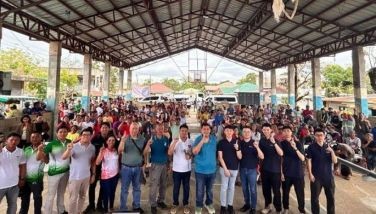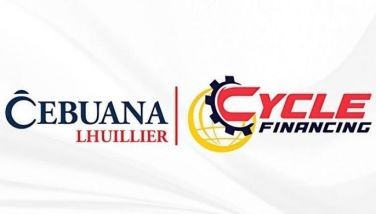Our inner chains

Last week, we commemorated the 122nd year since the declaration of Philippine independence. We did this amidst a global pandemic that has frayed institutions and exposed grave inequalities.
We know the story of how the Spanish encountered our archipelago while they were seeking spices, and proceeded to conquer much of these islands – many of which were already homes of vibrant indigenous communities. The Philippines as a nation-state was born with chains on its hands, under the heel of a foreign conqueror.
Except, that’s not completely accurate. While the Spanish were the ones who gave the orders, the boot that grounds down the necks of Filipinos was often not that of a foreign oppressor, but that of another Filipino.
History shows that the number of Spanish citizens in the Philippines was only ever a small fraction when compared to the Filipino population. Even when it came to the Spanish military presence in the country, there were times when the majority of the soldiers were Filipinos. Some accounts indicate that there were years when the Filipino soldiers outnumbered the Spanish five to one (and this is considered by some to be a conservative number that did not include Filipinos serving in stationary garrisons).
When there was resistance to Spanish incursions, or when revolts arose – such as that of Andres Malong in 1660 – the suppressive forces used by the Spanish often included many Filipinos. In fact, the very conquest of Manila in 1571 was likely dependent on the presence of local soldiers.
The Spanish may have ruled us, but it was Filipinos that did the work of keeping the Filipino people down.
The Spanish instigated the process of oppression, of course. They took those of us who were non-Christians, those of us with Chinese ancestry, any group that the Spanish deemed to be undesirable, and made them targets and scapegoats. They used existing inequalities to their advantages by co-opting the ruling classes, and used religion and propaganda to create an attitude of subservience and loyalty to Spain.
But the fact remains that many Filipinos served as tools of the occupiers, even while others were fighting for freedom and equality. For some of those who served in the Spanish armies, this may not have been a question of loyalty but of necessity – the desire to avoid other, harsher types of forced labor. Others, mostly the datus and former ruling classes, simply believed that they were different from “lesser” Filipinos. They were content to live in the comfort that their status provided to them, not considering the greater oppression faced by other Filipinos to be any of their concern, in denial that the same oppression could be applied to them at any point at the whim of the conquerors.
And this is how a tiny Spanish minority retained control of much of the Philippines for over 300 years – with invisible chains built into the minds of the Filipino. Chains of prejudice and discrimination, of a willingness to accept the status quo as inevitable and unchangeable.
June 12 is a meaningful day, an important symbol, but we must not mistake its symbolism for anything else. Freedom is not a fact, it is a process, something we must continuously and diligently strive for.
The freedom of a nation is dependent on the freedom of its people, with the willingness of its people to acknowledge the chains in our minds – the ideologies and prejudices that have worked their way into the stories we’ve been told, the institutions we depend on, and the identities we’ve constructed for ourselves and our people.
We are always under the influence of something – our upbringing, our traumas, the media we consumed, the mentors we had, the betrayals we bore. We are all biased, and will always be biased, and that on its own is not a negative thing but a simple fact of life. All of us have a body, a history, a position from which we interact with the world. If a minor earthquake occurs and I am on the ground floor while my friend is on the 40th floor, each of us will be biased toward our own experience. I may not have felt the quake at all.
But things start to go wrong when I refuse to acknowledge my bias. When I insist on the primacy and universality of my own experience (“If I didn’t feel an earthquake then no earthquake occurred”), and when I devalue the experiences of others and scientific data that contradicts my bias. This is when bias turns to discrimination. When I fall victim to discrimination, I also become blind to the flaws of any system or institution that supports those biases. That is when my discrimination makes me a part of oppression, when I become a tool for the conqueror, a boot for the tyrant.
Freedom means being open, being willing to listen to the experiences of others, particularly the marginalized. Those who fall through the cracks of the system – or those that the system actively places at a disadvantage – are the ones that know where it fails, and how it can be improved. Listening can be a painful thing– it can reveal aspects of our lives where we enjoy privileges that come at a cost to others, even if that cost is simply perpetuating a system that is fair to us but unfair to them.
None of us like to feel that we are part of the problem, especially when we consider ourselves to be sympathetic allies to those in need, or because we consider ourselves oppressed in our own way. But the only way we can say that we are allies is if we listen: to the anger, the disappointment, the fear and the judgment of those whom the system has failed. To be able to set aside the instinct to shield our biases – and to claim that we have no bias or that we are “objective” is the most insidious shield of all – is a difficult thing, but the alternative is much worse.
It takes more than a declaration for a nation to be free. It takes a people who are committed to working to build a nation which leaves no one behind. A people committed to listening.
A people with the strength to look in the mirror with eyes wide open and see that some chains that enslave us are the ones we impose on ourselves.
- Latest
- Trending


























